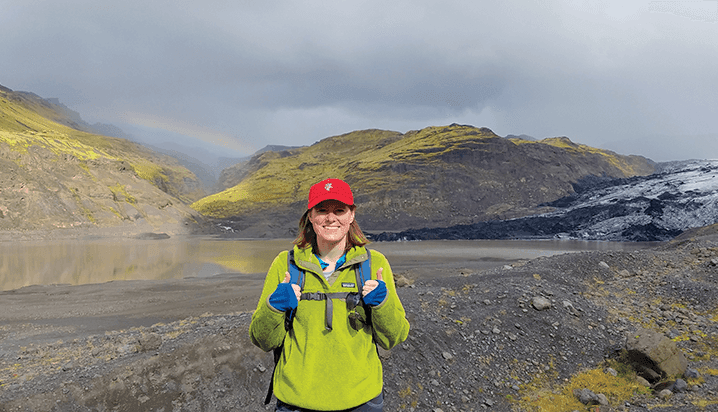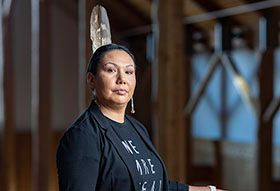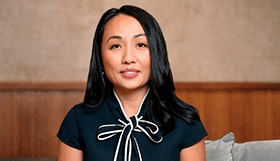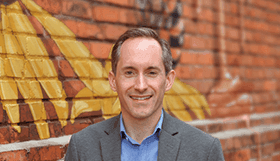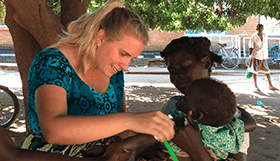UW Major: Astrophysics and Physics
Age: 29 | Tucson, Arizona
Postdoctoral Research Associate, Lunar and Planetary Laboratory, University of Arizona
When humans launch the first crewed expedition to Mars, there’s a chance planetary scientist Ali Bramson has found them a friendly spot to land.
From a laboratory in
Arizona, Bramson studies some of our solar system’s most frozen frontiers:
ice, lava flows, and glaciers on Mars; ice on the moons of Uranus; and
cryovolcanic eruptions (with lava that consists of water and ice rather than molten
rock) on the dwarf planet Ceres.
Bramson found her calling for the interdisciplinary nature of planetary science during her time at UW–Madison. In addition to her degrees, she earned a certificate in computer science, which she has found very useful in her career. Participating in summer undergraduate research programs and attending scientific conferences also provided giant leaps toward achieving her dream to explore space. “I fully realized my passion for planets, especially characterizing their surfaces using data from spacecraft missions — robots in space!” Bramson says.
In 2015, Bramson’s
work attracted the world’s attention with a most intriguing find. Using images
collected by NASA spacecraft, Bramson’s research team zoomed in on an area in
Arcadia Planitia, a flat, icy region in Mars’s northern reaches where craters
are common. But they found one crater with peculiar terracing that showed
layers below the surface.
The big find? The
crater had formed due to a meteorite impact into one of the red planet’s most
massive ice sheets: 130 feet thick, it covers an area as big as California and
Texas combined. Sites like this are potential locations where Mars-bound
astronauts could start their exploration, since the availability
of frozen water may be crucial to their survival.
Bramson, a proud alumna, refers to the location as “Badger Crater,” although it hasn’t been officially named yet.
Through her ongoing planetary research using spacecraft radar, Bramson works with colleagues to broaden what Earthlings know about the climate of Mars. Most importantly, she wants to tell you all about it.
“While my research on other planets doesn’t necessarily directly affect people’s day-to-day life, I apply the Wisconsin Idea by speaking about my science,” Bramson says. “If I learn something new about the universe but don’t convey that information to anyone, then what was the point?”
Photo courtesy of Ali Bramson
Q&A with Ali Bramson
What’s the best piece of advice you’ve ever received?My dad’s mantra is that the quality and depth of relationships and experiences are what’s important in life. As I’ve been getting older, I’ve been realizing more and more how useful this advice is for keeping perspective on what matters. It’s helped me prioritize spending my time on building relationships with people who are important to me and on gaining experiences that fulfill me and help me grow, either personally or professionally.What is the one thing every UW student must do?Hang out at the Union and take advantage of everything it has to offer! The UW is so unique in having such vibrant, fun, multipurpose student unions. In the summer, go rent a kayak from Hoofers and paddle around Lake Mendota for an hour. Then come back and sit on the Terrace with a beer and ice cream made down the street at the campus dairy … and then listen to live music or play cards or watch a movie. You can’t do that anywhere else! What a magical place.What is your favorite quote?
“We choose to go to the Moon … and do the other things, not because they are easy, but because they are hard.” — John F. Kennedy
It is amazing how much was accomplished in that decade with the willpower and drive and resources going towards achieving one particular goal. This is my favorite quote because it can be applied to so many aspects of life, from the biggest to the smallest activities and choices. It reminds me that if something is easy, it’s because I’m not pushing myself or learning anything from it. If something is hard, it’s because I’m learning a new skill set, or going outside my comfort zone, or trying to do something that’s never been done before.Who is your hero, or who or what inspires you?
I was obsessed with the idea of becoming an astronaut starting at five years old, so naturally, Sally Ride was my role model as a kid and has always been an inspiration to me. She was not only the youngest American to go into space, but she also became an astronaut through getting her bachelor’s and PhD in physics. I’m very inspired by the Apollo era and what was accomplished in such a short period of time. But growing up watching movies like Apollo 13 and October Sky, it seemed the closest women got to becoming an astronaut or rocket scientist was to either be the wife or the teacher of an astronaut.
Sally Ride helped me figure out that what I really wanted to do was study space by becoming a scientist, and that I could achieve it. I’m so glad that stories like Hidden Figures are starting to be told, and we need more of that to help break down the structural inequalities that have kept whole populations of people out of science for so long. My grandma wanted to major in math when she went to college, but she was forced out for being a woman (she was told the wrong dates for the exams so she would score a zero percent and fail the courses). Even in this day and age, I’ve been told women don’t belong in science. STEM should be accessible to all who wish to be a part of it — and it needs to be, if we’re going to utilize all the untapped potential that’s out there for solving the problems in the world and learning about how our universe works.What’s next for you?I’ve been so lucky to have great mentorship throughout my education and research career, and it has made me want to stay in an environment where I can teach and mentor. I’d like to inspire people about science through exploration of our solar system and help them learn to seek, sift, and critically evaluate information. But I also want to continue my research and working with NASA spacecraft missions. I really like the vibrancy of academic settings, so after my postdoctoral work, I’m hoping to become a professor at a research university.
